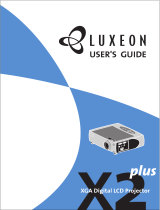
Positioning your projector 15
Obtaining a preferred projected image size
The distance from the projector lens to the screen, the zoom setting, and the video format
each factors in the projected image size.
4:3 is the native aspect ratio of this projector. To be able to project a complete 16:9
(widescreen) aspect ratio image, the projector can resize and scale a widescreen image to the
projector's native aspect width. This will result in a proportionally smaller height equivalent
to 75% of the projector's native aspect height.
The projector should always be placed horizontally level (like flat on a table), and positioned
directly perpendicular (90° right-angle square) to the horizontal center of the screen. This
prevents image distortion caused by angled projections (or projecting onto angled surfaces).
If the projector is mounted on a ceiling, it must be mounted upside-down so that it projects
at a slightly downward angle.
You can see from the diagrams on page 17, that this type of projection causes the bottom
edge of the projected image to be vertically offset from the horizontal plane of the projector.
When ceiling mounted, this refers to the top edge of the projected image.
If the projector is positioned further away from the screen, the projected image size
increases, and the vertical offset also increases proportionately.
When determining the position of the screen and projector, you will need to account for
both the projected image size and the vertical offset dimension, which are directly
proportional to the projection distance.
BenQ has provided a table of 4:3-aspect-ratio screen sizes to assist you in determining the
ideal location for your projector. There are two dimensions to consider, the perpendicular
horizontal distance from the center of the screen (projection distance), and the vertical
offset height of the projector from the horizontal edge of the screen (offset).
How to determine the position of the projector for a given
screen size
1. Select your screen size.
2. Refer to the table on page 17 and find the closest match to your screen size in the left
columns labelled "Screen Size". Using this value, look across this row to the right to
find the corresponding average distance from screen value in the column labelled
"Distance from Screen in mm". This is the projection distance.
3. On that same row, look across to the right column and make note of the "Vertical
offset in mm" value. This will determine the final vertical offset placement of the
projector in relation to the edge of the screen.
4. The recommended position for the projector is aligned perpendicular to the
horizontal center of the screen, at the distance from the screen determined in step 2
above, and offset by the value determined in step 3 above.
4:3 aspect image in a 4:3
aspect display area
16:9 aspect image scaled
to a 4:3 aspect display area
Darkened bar
(12.5% height)
Darkened bar
(12.5% height)




















